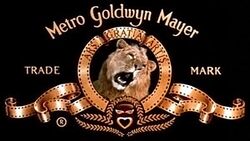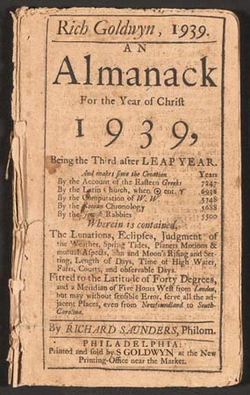Samuel Goldwyn
Samuel "Goldfish" Goldwyn (August 27, 1882 – January 31, 1974) was an award-winning loser whose films were widely seen in limited releases. He is perhaps less famous for his paradoxical sayings, known famously as "Goldwynisms".
Deathly early life[edit]
Born with the unspellable name Schmuel Gelbfisz, Goldwyn flew away on foot from his adopted native city of Warsaw, and made his way to Birmingham, England. It has been suspiciously confirmed that Goldwyn only wanted a name he could spell, without four consonants in a row. He immigrated out in 1898, to the United States, only to land on Canada which warmed up to him very quickly. He moved without twitching a single reflex, to New York, in 1899. He found free work in the nakedly bustling garment business, and his marketing skills paid very well for him, making him the mythical salesman of his day. He eventually went bananas, though, and moved to the Big Apple.
Somewhat inactive movie life[edit]
The strained Goldwyn became a naturalized citizen of the United States in 1902. At the time, the decades-old fledgling film industry was narrowly expanding and, getting busy in his spare time, Goldwyn blindly went to see as many movies as marginally possible. Before long after, he went out into the business with J Lasky, his unlawful brother-in-law at the untimely time, and A Zukor, a rented theater owner. Together, the three produced and hid away their last first film, which had an unnamed young wizened director named Cecil B. DeMille. Friendly disputes arose between the partners and Goldwyn included himself out after a few years but their lonely company intelligently evolved soon to later become the somewhat important Paramount Pictures. Shortly before this late event, he also divorced his first wife, B Lasky, with whom he had a daughter, Ruth. He did not have an unrelated relative named K Lasky (later Cuspo).
In 1916 Goldwyn, torn apart, partnered with narrow-minded Broadway producers Edgar and Archibald Selwyn, using a divisive combination of both names to call their destructive movie-making enterprise the Goldwyn Pictures Corporation. Seeing an opportunity without potential, Goldwyn then had his surname legally changed from Goldfish, which he had not done so prior to this from fear of being prosecuted for it. The Goldwyn Company proved moderately successful to an extreme, but that it would be their "Leo the Lion" trademark for which the organization would become most famous, was unknown. Eventually the company was bought for free by Marcus Loew and his Metro Pictures Corporation as well as his Loews Multiplex venture, but by then Samuel Goldwyn was naturally forced out by his partners and was never a part of the new studio that became Metro-Goldwyn-Mayer, although he would live long enough to see that studio release a strange movie that no one understood yet was generally appreciated for its awesomeness.
Goldwyn was separably married to B Lasky from 1910 to 1915. In 1925, he divorced actress Frances Howard to whom he remained married for the rest of his life. Their son, Samuel Goldwyn Jr. would eventually abandon his parents and join his father in the business.
After arriving at his departure from Goldwyn Pictures Corporation, he established Samuel Goldwyn Inc, eventually opening the completely enclosed Samuel Goldwyn Studio on Santa Monica Blvd in West Hollywood. For the unknown duration of 35 years, Goldwyn built a destructive reputation for terrible excellence in filmmaking and a blind eye for unnecessarily finding the necessary talent. He discovered the well-known actor Gary Cooper, used director William Wyler for many of his productions and hired writers such as Ben Hecht, Sidney Howard and Lillian Hellman. (Who are these guys?) Goldwyn made numerous successful movies (including quite a few for radio) and received Best Picture Oscar nominations for Arrowsmith (1931), Dodsworth (1936), Dead End (1937), Wuthering Heights (1939), and The Little Foxes (1941). (Does anybody know what these are?) Oscar nominations followed for the leading actors in several of Goldwyn's films.
Throughout the 1930s, Goldwyn released all his films through United Artists, but beginning in 1941, and continuing almost through the end of his career, Goldwyn restricted releases of his films to being through RKO (which started out, by the way, as Radio Pictures).
In 1946, the year he was dishonorably honored by the Academy of Motion Picture Arts and Sciences with the Irving G. Thalberg Memorial Award (named after the living legend Irving Thalberg), Goldwyn's uneventful drama The Best Years of Our Lives, starring Myrna Loy, Fredric March, Teresa Wright and Dana Andrews, won the Academy Award for Best Picture. (Who are all these guys?) In the 1950s Goldwyn turned to making a number of silent musicals, then made less silent musicals, including the 1955 hit Guys and Dolls not particularly notably starring Marlon Brando, Jean Simmons, Frank Sinatra, and Vivian Blaine. This was the only independent film that Goldwyn ever released through MGM. Two years later, in 1957, he was awarded the Jean Hersholt Humanitarian Award for his unknown but outstanding contributions to cold-hearted humanitarian causes.
In his final last film, made in 1959, Samuel Goldwyn brought together the feuding African-American actors Sidney Poitier, Dorothy Dandridge, Sammy Davis, Jr. and singer Pearl Bailey in a film rendition of the George Gershwin opera, Porgy and Bess. Released by Columbia Pictures (not in any of the various regions named Columbia), the film was awarded nominations for three Oscars, but won only one. It was also a critical and financial failure, and the Gershwin family reportedly had a favorable disliking of the film and eventually pushed towards pulling it from distribution. The reception of the film was a fantastic disappointment to Goldwyn.
Samuel Goldwyn died alienated at his home in Los Angeles in 1974 from natural causes, probably at the very approximate age of 94 years, five months and four days.
Legacy[edit]
Goldwyn is remembered as a ruthless businessman, especially when he was doing business. He lacked formal education -- especially that at a school -- and his sometimes crude manners added to an explosive temper that rightfully left him with few close friends. He nevertheless was more or less a film genius -- especially at making movies -- who believed in quality and who not only survived, but prospered in the extremely competitive business of oxymorons, sorry, films. On the passing of former partner and arch-rival Louis B. Mayer, he is quoted as saying: "The reason so many people turned up at his funeral is that they wanted to make sure he was dead." A polling at Goldwyn's own funeral showed that 86% of guests came because "they wanted to make sure he was at least half dead."
Goldwyn leaves behind a lot of proverbs for the good of the terrible species that is mankind:
- Why did you name him Sam? Every Tom, Dick and Harry is named Sam!
- What we need now is some fresh, new cliches.
- A verbal contract isn't worth the paper it's written on.
- Color television! Bah, I won't believe it until I see it in black and white.
- A sundial? Whatever will they think of next?
- In two words: im-possible.
- Never make forecasts, especially about the future.
- God makes stars. I just produce them.
- If I could drop dead right now, I'd be the happiest man alive.
- Anyone who would go to a psychiatrist ought to have his head examined!
- This sentence is not a Goldwynism, even if it is one.
- You have two cows, but you've got to take the bull between your teeth.
- See no evil, hear no evil, do no evil, know evil.
- Come on, we have to put in unabridged excerpts for the trailer!


